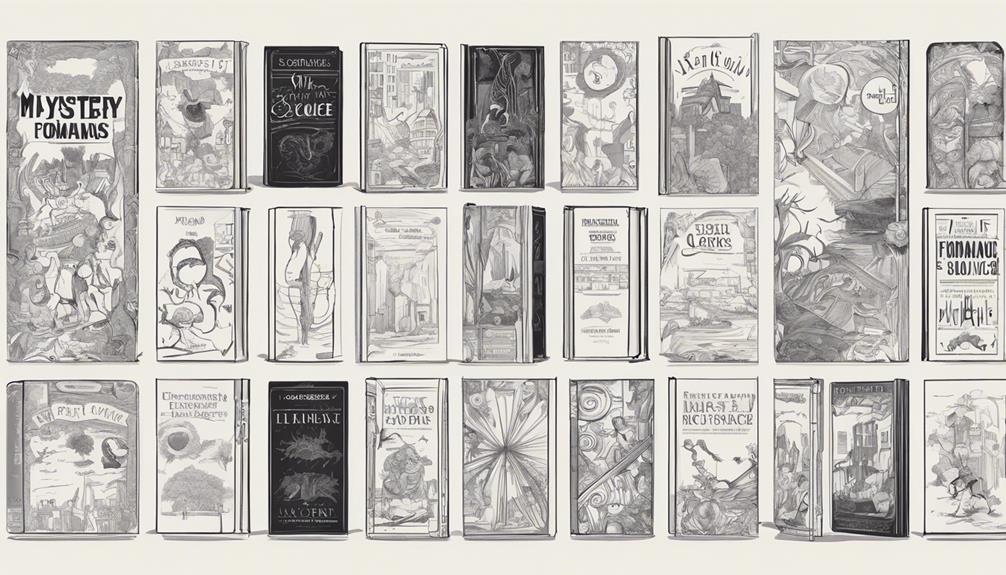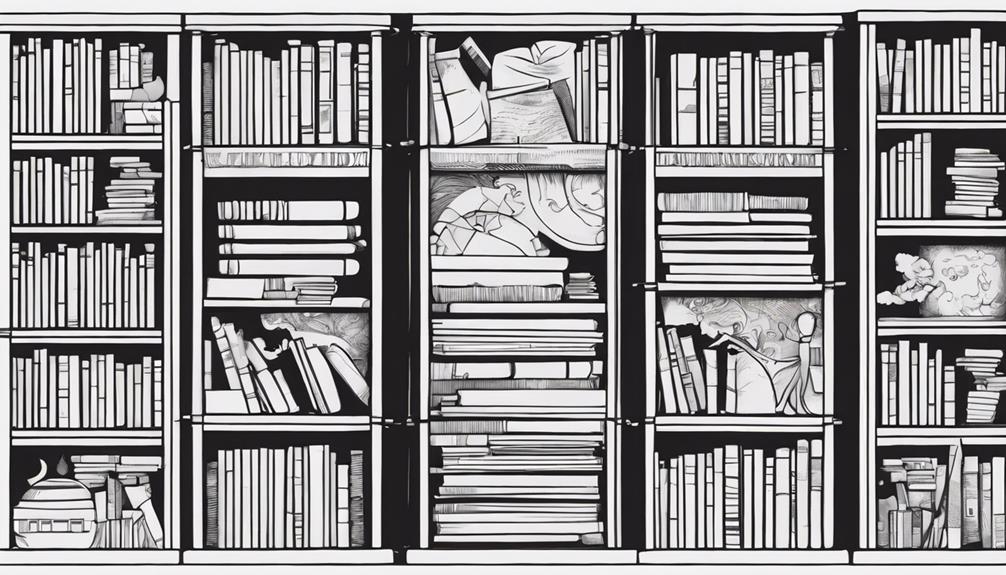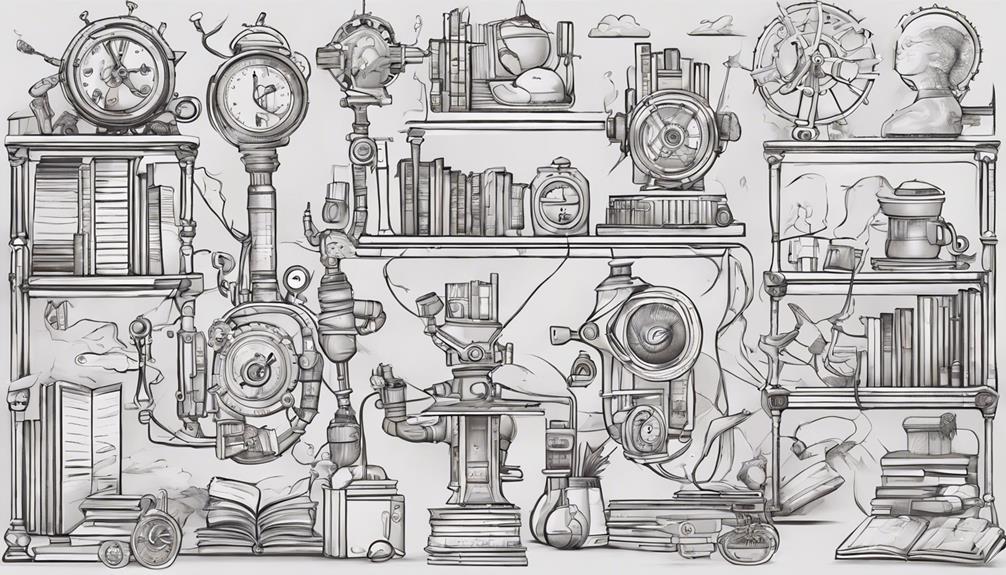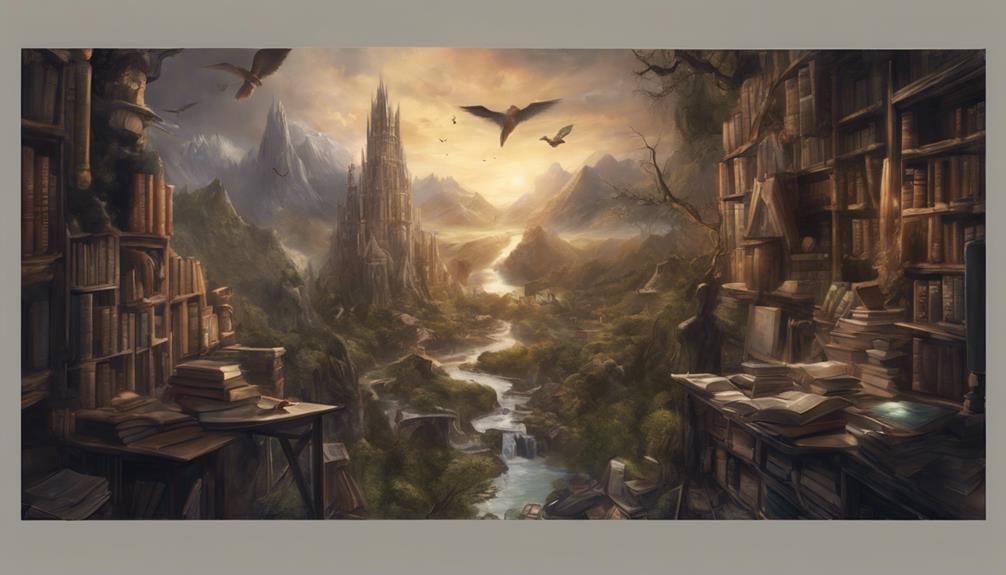An exploration of book genres reveals a vast array of categories, each with its unique characteristics and appeal to readers. From the imaginative realms of fantasy and science fiction to the factual landscapes of memoirs and biographies, the diversity of genres offers a rich tapestry of storytelling possibilities. By dissecting the nuances of these genres, we can uncover hidden gems and undiscovered territories within the literary world, providing a foundation for further investigation into the intricate web of genres that shape our literary experiences.
Key Takeaways
- Fiction genres vary from mystery to fantasy, catering to different reader preferences.
- Nonfiction categories span from biographies to cli-fi, offering diverse informational content.
- Memoirs and biographies provide personal and third-person insights into individuals' lives.
- Unique genres like slipstream and bizarro fiction offer unconventional and boundary-pushing storytelling experiences.
Fiction Genres Overview

Fiction genres serve as fundamental frameworks that delineate the imaginative realms of storytelling, providing a structured classification system based on thematic elements and stylistic conventions. Within the vast landscape of fiction genres, popular categories include fantasy, science fiction, thriller, romance, and historical fiction. Each genre boasts distinct characteristics that captivate readers and offer unique storytelling experiences. Fantasy genres transport readers to magical worlds filled with mythical creatures and enchanted realms, while science fiction delves into futuristic technologies and alternate realities. Thrillers keep readers on the edge of their seats with suspenseful plots and unexpected twists, whereas romance genres explore the complexities of love and relationships. Historical fiction genres immerse readers in bygone eras, blending fictional narratives with real historical events. Characters in fiction genres play pivotal roles, driving the plots forward and engaging readers in their journeys. By understanding the nuances of each genre, writers can craft compelling stories tailored to specific reader preferences and expectations.
Nonfiction Genres Breakdown
Nonfiction genres encompass a range of informative and educational categories that cater to diverse reader interests. From biographies and autobiographies providing insights into individuals' lives to history and science books exploring past events and educational topics, nonfiction genres offer a wealth of knowledge. Self-help books serve as guides, supporting readers in navigating life's challenges and seeking personal growth.
Nonfiction Types Overview
In exploring the diverse landscape of nonfiction literature, it becomes imperative to dissect the various genres that offer unique perspectives on real-world experiences and knowledge. Memoirs and autobiographies delve into personal life experiences through first-person narratives, providing readers with intimate insights. Biographies, on the other hand, offer a third-person perspective on the lives of notable individuals, allowing for a more objective portrayal. History books chronicle past events, shedding light on significant historical moments and their implications. The Food & Drink genre not only offers diverse recipes but also includes personal stories and cultural cuisines, enriching the reader's understanding of food beyond mere sustenance. Poetry collections, through various forms of poetic expression, evoke emotions and thoughts, adding a touch of artistic flair to nonfiction literature.
Popular Nonfiction Categories
Exploring the landscape of nonfiction literature reveals a rich tapestry of popular categories that provide unique perspectives and insights into real-world subjects.
- Biography & Memoir: Offers insights into notable individuals' lives from a third-person perspective.
- History: Chronicles past events to educate and entertain readers.
- Food & Drink: Caters to diverse diets, lifestyles, and cultural cuisines.
- Poetry: Encompasses various poetic forms and expressions, evoking emotions and thoughts.
- Self-Help: Provides guidance and strategies for personal growth and development.
Each of these genres serves a distinct purpose, offering readers the opportunity to delve into different aspects of human experience, knowledge, and creativity. Whether delving into the lives of remarkable individuals, exploring the annals of history, savoring diverse culinary traditions, or immersing oneself in the beauty of poetic forms, nonfiction literature presents a vast array of enriching possibilities.
Popular Fiction Genres Explained

Popular fiction genres encompass a wide array of storytelling categories that cater to diverse reader preferences and interests. These genres, such as mystery, fantasy, and science fiction, offer readers engaging and immersive experiences through captivating stories. Mystery genres keep readers on the edge of their seats with suspenseful plots and intriguing characters, while fantasy genres transport them to magical realms filled with mythical creatures and epic adventures. Science fiction genres explore futuristic concepts, technological advancements, and the impact of science on society, sparking the imagination of readers. Each popular fiction genre, including historical and fantasy novels, has distinct characteristics and themes that contribute to its unique appeal. By understanding these genres, authors can effectively target specific reader demographics and interests, guiding them towards their preferred reading choices. Categorizing books into fiction genres plays a vital role in helping readers discover new stories that align with their tastes and preferences.
Exploring Nonfiction Genres
Delving into the diverse landscape of nonfiction genres reveals a rich tapestry of factual accounts and informative narratives that aim to enlighten and educate readers. Nonfiction genres encompass a wide range of subjects, from exploring individuals' lives to unraveling the mysteries of the past, natural world, and educational topics. Here are five essential categories within nonfiction literature:
- Biography/Autobiography: Offering true accounts of individuals' lives, biographies provide insights into the experiences and achievements of notable figures, while autobiographies offer a personal narrative of one's own life journey.
- History: Delving into past events, history books chronicle the shaping of societies, cultures, and civilizations, providing invaluable lessons from the past.
- Biology/Science: Exploring the natural world and scientific principles, these genres unravel the mysteries of life and the universe, expanding our understanding of the world around us.
- Self-Help: Offering guidance and support, self-help books empower readers to navigate life's challenges, offering strategies for personal growth and development.
- Educational Topics: Covering a wide array of subjects, educational nonfiction books aim to inform and enlighten readers on various disciplines and fields of study.
Niche Fiction Genres Unveiled

Niche fiction genres represent a specialized segment of the literary landscape, tailored to specific tastes and preferences. These genres offer authors a platform to push the boundaries of traditional storytelling, exploring unconventional themes and styles not commonly found in mainstream literature. Readers who seek fresh and innovative narratives often find solace in the unique storytelling experiences that niche fiction genres provide.
Unique Fiction Categories
What unique characteristics distinguish lesser-known fiction genres from more mainstream literary categories? Niche fiction genres, such as weird fiction and bizarro fiction, offer specialized reading experiences tailored to unique preferences. These genres are known for their unconventional storytelling approaches, catering to specific audiences seeking out-of-the-box narratives. Emphasizing creativity and innovation in storytelling, niche fiction genres encourage writers to explore new realms of imagination. Delving into these hidden gems within the literary world can lead readers to discover truly innovative and captivating narratives that provide a refreshing break from more traditional storytelling styles.
Lesser-Known Genres
Exploring the realm of lesser-known genres in the literary landscape unveils a tapestry of niche fiction categories that offer readers unique and unconventional storytelling experiences. Genres such as 'Bizarro Fiction' and 'New Weird' push the boundaries of traditional storytelling with their peculiar and avant-garde narratives. 'Chick Lit' and 'Gonzo Fiction' cater to specific reader preferences, focusing on themes that resonate with distinct audiences. 'Weird Western' and 'Mythic Fiction' blend elements of fantasy and westerns, creating a fusion that sparks creativity and innovation. Genres like 'Slipstream' and 'Weird Fiction' challenge conventional norms with their surreal and speculative components. For enthusiasts of alternate history and retro-futurism, 'Steampunk' and 'Dieselpunk' offer captivating narratives set in historical contexts infused with advanced technologies, providing a unique reading experience for those intrigued by unconventional storytelling.
Lesser-Known Nonfiction Genres
In the realm of nonfiction literature, certain genres, such as 'cli-fi' and 'bibliomemoirs', stand out for their unique and lesser-known focus within the literary landscape. These genres offer readers a diverse range of perspectives and experiences, delving into niche topics that provoke thought and emotion. Here are some lesser-known nonfiction genres to explore:
- 'Up lit': Offers positivity and hope in storytelling, uplifting readers' spirits.
- 'Solastalgia literature': Explores the emotional impacts of environmental change on individuals, fostering empathy and awareness.
- 'Microhistory': Delves deep into the history of small, specific topics or events, shedding light on lesser-known aspects of the past.
- 'Foodoirs': Blend food writing with personal memoirs, providing readers with unique culinary experiences that evoke nostalgia and sensory delight.
- 'Unthology': A collection of nonfiction essays that challenge traditional narratives and push boundaries, sparking critical thinking and reflection.
These genres offer a fresh perspective on nonfiction writing, catering to readers seeking intellectual stimulation and emotional engagement.
Frequently Asked Questions
How Many Book Genres Exist?
There is no definitive count of book genres due to the evolving nature of literature. However, the categorization of books typically includes fiction genres, nonfiction genres, literary categories, popular genres, niche markets, genre definitions, emerging categories, classic genres, modern trends, and subgenre variations. The fluidity and diversity within these classifications suggest that the number of book genres is not fixed and can vary depending on individual interpretations and evolving literary landscapes.
What 4 Main Genres Are There?
The main genres of books encompass diverse categories, such as fiction, nonfiction, poetry, and drama. Fiction engages in imaginative storytelling, while nonfiction delves into factual information. These genres offer readers a spectrum of choices ranging from classic literature to modern novels, mystery thrillers to fantasy worlds, romance novels to science fiction, and historical fiction to young adult literature. Each genre caters to distinct preferences, ensuring a rich tapestry of literary offerings for readers to explore.
What Are the 5 Types of Genres That a Novel Can Be Written In?
Novels encompass a diverse array of genres, catering to varied reader preferences. From fantasy, science fiction, mystery, romance, to historical fiction, each genre offers distinct storytelling elements and themes. Understanding these genres is crucial for writers to create engaging narratives. Genre exploration allows for the appreciation of fiction's breadth, from literary classics to current bestselling genres. Analyzing genre conventions, trends, and marketing strategies aids in crafting compelling novels that resonate with target audiences.
What Do the Different Genres of Books Mean?
Book genres play a crucial role in literature, distinguishing between fiction and nonfiction, classic and contemporary works, literary and commercial styles, mysteries and romances, science fiction and fantasy stories, historical and speculative fiction, thrillers and horrors, young adult and adult literature, comedies and dramas, as well as memoirs and biographies. Understanding these distinctions helps readers navigate the vast world of books, catering to various preferences and expectations within the realm of storytelling.
Conclusion
In conclusion, the diverse world of book genres offers readers a vast array of storytelling styles and themes to explore. Just as a garden contains a variety of flowers, each genre blooms with its unique characteristics and appeal. By understanding the distinctions between fiction and nonfiction genres, readers can navigate literary landscapes with precision and find the perfect book to suit their preferences. Embrace the richness of genres like a connoisseur sampling different flavors, savoring each distinct experience.
